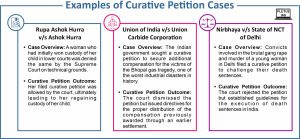12 Oct Curative Petition
This article covers “Daily Current Affairs” and the Topic details “Curative Petition”. This Topic has relevance in the Polity and Governance section of the UPSC CSE exam.
For Prelims:
What is a Curative Petition?
Conditions for Filing a Curative Petition?
For Mains:
GS 2: Polity and Governance
Factors Considered by the Court?
Examples?
Why in the news?
Vodafone Idea has submitted a curative petition to the Supreme Court concerning a previous judgment that rejected telecom companies’ requests for rectifying errors in their liability for Adjusted Gross Revenue (AGR) dues.
What is a Curative Petition?
- A curative petition is a legal remedy used to rectify a final judgment of the Supreme Court that has been upheld, even after a review petition. It is designed to correct grave errors and prevent miscarriages of justice, but it is typically entertained only in exceptional circumstances.
Conditions for Filing a Curative Petition:
- Filing Timeframe: The curative petition must be filed within 30 days of the dismissal of the review petition.
- Senior Advocate Requirement: The petition must be signed by a senior advocate of the Supreme Court, signifying the seriousness and expertise involved in the process.
- Specific Grounds for Review: The petition must clearly state specific grounds for review, including instances of gross miscarriage of justice, violations of natural justice principles, the discovery of new and crucial evidence, or cases of fraud/suppression of material facts during the trial.
- Good Faith Confirmation: The petition must be accompanied by a certificate from the senior advocate, confirming that the petition has been filed in good faith and that there are reasonable grounds for review.
Review Process for Curative Petitions
Constitution of Review Bench:
- A curative petition is assessed by a bench of five judges, including three of the most senior judges of the Supreme Court.
Hearing and Consideration:
- If the bench decides to hear the curative petition, it evaluates arguments presented by both the petitioner and the respondent.
- The court may appoint an impartial adviser, known as an “amicus curiae,” to provide expert opinions and recommendations.
Judgment Delivery:
- Following the hearing, the bench delivers its judgment.
- In exceptional cases, if the curative petition is granted, the original judgment may be set aside, and a fresh hearing of the case may be ordered. This is a rare occurrence.
Grounds for Filing a Curative Petition
- Gross Miscarriage of Justice: This ground involves significant errors in the judgment leading to a miscarriage of justice.
- Violation of Natural Justice: This pertains to the court’s failure to adhere to fundamental fair trial principles, including the right to be heard and the right to know the case against oneself.
- Discovery of New Evidence: New evidence that could substantially impact the case’s outcome.
- Fraud or Suppression of Material Facts: Instances where fraud or the suppression of critical information occurred during the trial.
Factors Considered by the Court
- Seriousness of Allegations: The gravity of the claims made in the curative petition is a significant factor.
- Nature of Error: The type and extent of the error alleged in the court’s prior judgment.
- Potential Impact: The likelihood that the error could have substantially affected the case’s outcome.
- Impact on the Justice System: Considering how entertaining the curative petition might influence the broader administration of justice.

Conclusion
Curative petitions in India serve as a rare and extraordinary legal recourse, primarily designed to rectify severe errors and miscarriages of justice. This legal process is rigorous, demanding the substantiation of the grounds for filing and the competence of legal representation. As a last resort, curative petitions hold a pivotal role in ensuring fairness and justice within the legal system but are entertained solely in the most exceptional circumstances, highlighting their paramount importance in the Indian legal landscape.
Download plutus ias current affairs eng med 12th Oct 2023
Q.1 With reference to the Curative Petition, consider the following statements:
- A curative petition can only be filed to challenge the constitutionality of a law.
- It can be filed within 60 days of the law’s enactment.
Which of the statements given above is/are correct?
(a) 1 only
(b) 2 only
(c) Both 1 and 2
(d) Neither 1 nor 2
Q.2 With reference to the Curative Petition, consider the following statements:
- The curative petition must be filed within 30 days of the dismissal of the review petition.
- The petition must be signed by a senior advocate of the Supreme Court to be admitted.
Which of the statements given above is/are correct?
(a) 1 only
(b) 2 only
(c) Both 1 and 2
(d) Neither 1 nor 2
Q.3 Examine the significance and limitations of curative petitions in the Indian legal system. Discuss with examples.



No Comments